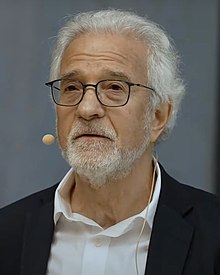Omer Bartov
American historian (1954-)
Omer Bartov (Hebrew: עֹמֶר בַּרְטוֹב [ʔoˈmeʁ ˈbaʁtov]; born 1954) is an Israeli-born historian. He is the Samuel Pisar Professor of Holocaust and Genocide Studies at Brown University, where he has taught since 2000. Bartov is a historian of the Holocaust and is considered one of the world's leading authorities on genocide.

| This article about a historian is a stub. You can help out with Wikiquote by expanding it! |
Quotes
edit- Israeli military operations have created an untenable humanitarian crisis, which will only worsen over time. But are Israel’s actions — as the nation’s opponents argue — verging on ethnic cleansing or, most explosively, genocide? As a historian of genocide, I believe that there is no proof that genocide is currently taking place in Gaza, although it is very likely that war crimes, and even crimes against humanity, are happening. That means two important things: First, we need to define what it is that we are seeing, and second, we have the chance to stop the situation before it gets worse. We know from history that it is crucial to warn of the potential for genocide before it occurs, rather than belatedly condemn it after it has taken place. I think we still have that time.
- What I Believe as a Historian of Genocide. The New York Times (10 November 2023).
- It is clear that the daily violence being unleashed on Gaza is both unbearable and untenable. Since the Oct. 7 massacre by Hamas — itself a war crime and a crime against humanity — Israel’s military air and ground assault on Gaza has killed more than 10,500 Palestinians, according to the Gaza Health Ministry, a number that includes thousands of children. That’s well over five times as many people as the more than 1,400 people in Israel murdered by Hamas. In justifying the assault, Israeli leaders and generals have made terrifying pronouncements that indicate a genocidal intent. Still, the collective horror of what we are watching does not mean that a genocide, according to the international legal definition of the term, is already underway. Because genocide, sometimes called “the crime of all crimes,” is perceived by many to be the most extreme of all crimes, there is often an impulse to describe any instance of mass murder and massacre as genocide. But this urge to label all atrocious events as genocide tends to obfuscate reality rather than explain it.
- What I Believe as a Historian of Genocide. The New York Times (10 November 2023).
- My greatest concern watching the Israel-Gaza war unfold is that there is genocidal intent, which can easily tip into genocidal action.
- What I Believe as a Historian of Genocide. The New York Times (10 November 2023).
- While we cannot say that the military is explicitly targeting Palestinian civilians, functionally and rhetorically we may be watching an ethnic cleansing operation that could quickly devolve into genocide, as has happened more than once in the past.
- What I Believe as a Historian of Genocide. The New York Times (10 November 2023).
- If we truly believe that the Holocaust taught us a lesson about the need — or really, the duty — to preserve our own humanity and dignity by protecting those of others, this is the time to stand up and raise our voices, before Israel’s leadership plunges it and its neighbors into the abyss. There is still time to stop Israel from letting its actions become a genocide. We cannot wait a moment longer.
- What I Believe as a Historian of Genocide. The New York Times (10 November 2023).
External links
edit- Omer Bartov at The New York Times
- Omer Bartov at Google Scholar
- Omer Bartov at ResearchGate
- Omer Bartov at Academia.edu
- Omer Bartov at JSTOR